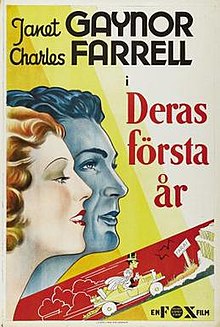
Janet Gaynor was an American film, stage and television actress as well as an accomplished oil painter.
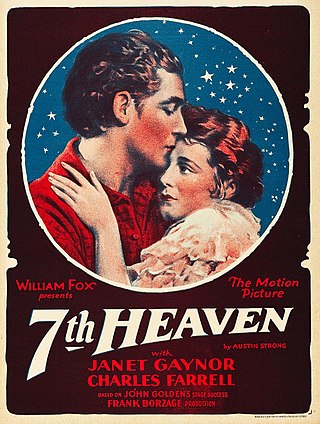
7th Heaven is a 1927 American synchronized sound romantic drama directed by Frank Borzage, and starring Janet Gaynor and Charles Farrell. While the film has no audible dialog, it was released with a synchronized musical score with sound effects using the Movietone sound system. The film is based upon the 1922 play Seventh Heaven, by Austin Strong and was adapted for the screen by Benjamin Glazer. 7th Heaven was initially released as a standard silent film in May 1927. On September 10, 1927, Fox Film Corporation re-released the film with a synchronized Movietone soundtrack with a musical score and sound effects.
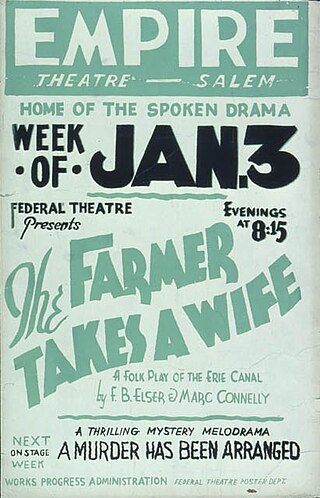
The Farmer Takes a Wife is a 1934 play by Frank B. Elser and Marc Connelly based on the 1929 novel Rome Haul by Walter D. Edmonds. It was well-received upon its opening night on Broadway on October 30, 1934, at the 46th Street Theatre. The production was directed by Marc Connelly, used set designs by Donald Oenslager, and starred Henry Fonda as Dan Harrow and June Walker as Molly Larkins.
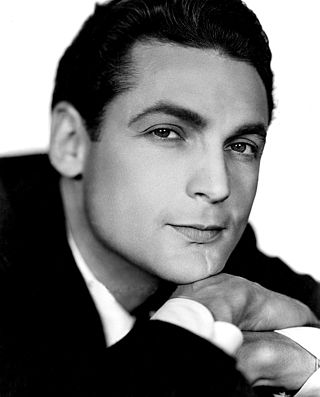
Charles David Farrell was an American film actor whose height was in the 1920s and 1930s and the Mayor of Palm Springs from 1947 to 1955. Farrell was known for his onscreen romances with actress Janet Gaynor in more than a dozen films, including 7th Heaven, Street Angel, and Lucky Star. Later in life, he starred on TV in the 1950s sitcoms My Little Margie and played himself in The Charles Farrell Show. He was also among the early developers of Palm Springs.

Marguerite Churchill was an American stage and film actress whose career lasted 30 years, from 1922 to 1952. She was John Wayne's first leading lady, in The Big Trail (1930).

Happy Days is a 1929 American pre-Code musical film directed by Benjamin Stoloff, which was the first feature film shown entirely in widescreen anywhere in the world, filmed using the Fox Grandeur 70 mm process. French director Abel Gance's Napoléon (1927) had a final widescreen segment in what Gance called Polyvision. Paramount released Old Ironsides (1927), with two sequences in a widescreen process called "Magnascope", while MGM released Trail of '98 (1928) in a widescreen process called "Fanthom Screen".

Lucky Star is a 1929 sound part-talkie American romantic drama film starring Janet Gaynor and Charles Farrell, and directed by Frank Borzage. In addition to sequences with audible dialogue or talking sequences, the film features a synchronized musical score and sound effects along with English intertitles. The soundtrack was recorded using the Movietone sound-on-film system. The plot involves the impact of World War I upon a farm girl (Gaynor) and a returning soldier (Farrell).

Delicious (1931) is an American pre-Code Gershwin musical romantic comedy film starring Janet Gaynor and Charles Farrell, directed by David Butler, with color sequences in Multicolor.

Merely Mary Ann a 1931 American pre-Code romantic comedy drama film starring Janet Gaynor and Charles Farrell. Gaynor and Farrell made almost a dozen films together, including Frank Borzage's classics 7th Heaven (1927), Street Angel (1928), and Lucky Star (1929); Gaynor won the first Academy Award for Best Actress for the first two and F. W. Murnau's Sunrise: A Song of Two Humans. The film, involving an orphan (Gaynor) and a flat-broke composer (Farrell), was written by Jules Furthman based upon Israel Zangwill's play of the same name and directed by Henry King.
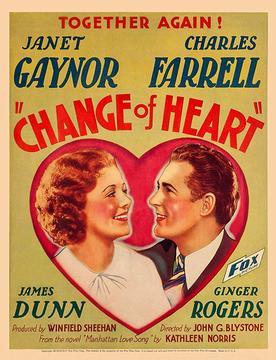
Change of Heart is a 1934 American pre-Code drama film starring Janet Gaynor, Charles Farrell, James Dunn, and Ginger Rogers. The movie, about a quartet of college chums who all move to 1934 New York City, was written by James Gleason and Sonya Levien from Kathleen Norris's novel, Manhattan Love Song and directed by John G. Blystone.

The Man Who Came Back is a 1931 American Pre-Code romantic drama film directed by Raoul Walsh, starring Janet Gaynor and Charles Farrell. The movie was adapted to screen by Edwin J. Burke from the play by Jules Eckert Goodman.

High Society Blues is a 1930 American pre-Code film starring Janet Gaynor and Charles Farrell. The movie was written by Howard J. Green from the story by Dana Burnett, and directed by David Butler.
Elda VoelkelHartley was an American stage and motion picture actress. Following a brief career as a Hollywood actress, which lasted from 1930 to 1932 and during which she accumulated four screen credits, Voelkel married filmmaker Irving Hartley, with whom she produced numerous documentary films on a wide range of subjects. In 1976, she created the Hartley Film Foundation, which was dedicated to promoting greater understanding of religion and spirituality.
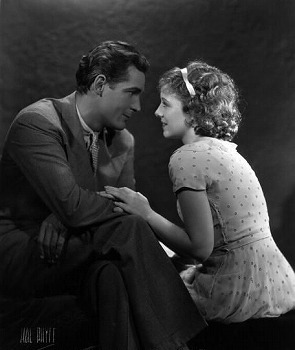
Tess of the Storm Country is a 1932 American pre-Code drama film directed by directed by Alfred Santell and starring Janet Gaynor, Charles Farrell, and Dudley Digges. It was released by Fox Film Corporation. It is based on the novel of the same name by Grace Miller White and its adaptation for the stage by Rupert Hughes.

A Trip to Chinatown is a 1926 American silent comedy film produced and distributed by the Fox Film Corporation and starring Margaret Livingston and Earle Foxe. The supporting cast includes Anna May Wong and Charles Farrell. The movie was scripted by Beatrice Van from Charles Hale Hoyt's hit 1891 Broadway musical of the same name and directed by Robert P. Kerr.
The House of Connelly is a 1931 Broadway two-act drama written by Paul Green, produced by the Group Theatre in association with The Theatre Guild and staged by Lee Strasberg and Cheryl Crawford. It ran for 91 performances from September 28, 1931 to November 14, 1931 at the Martin Beck Theatre and then from November 16, 1931 to January 2, 1932 at the Mansfield Theatre. It was the inaugural production of the Group Theatre.

Charles Kenneth Thomson was an American character actor active on stage and on film during the silent and early sound film eras.

Roi Cooper Megrue was an American playwright, producer, and director active on Broadway from 1914 to 1921.

Minerva Bussenius, known professionally as Roberta Arnold, was an American stage and silent film actress. She started in Los Angeles before moving to New York, appeared in leading roles in several Broadway plays and received positive reception.

The First Year is a 1920 American comedic play written by Frank Craven, and produced by John Golden and directed by Winchell Smith on Broadway. It was a hit on Broadway, running for 729 performances.
